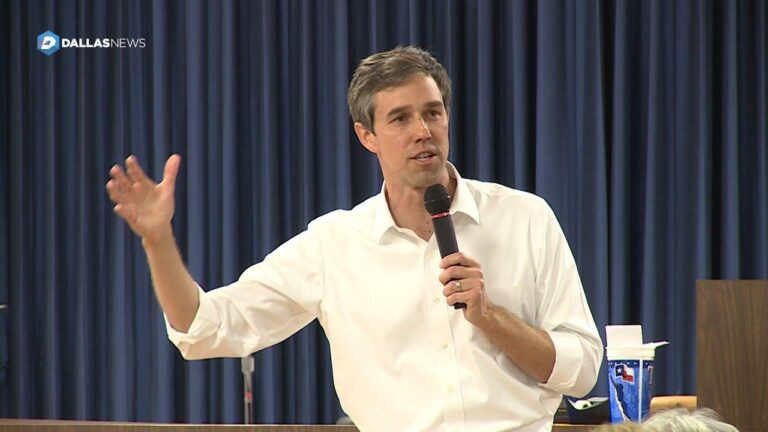Beto O’Rourke Engages Garland Residents with Forward-Thinking Policies
At a dynamic town hall event in Garland, Texas, former Congressman Beto O’Rourke connected directly with community members to discuss urgent local and national challenges. Central to the conversation were affordable housing initiatives and enhancing public safety. O’Rourke proposed actionable strategies aimed at expanding housing stock through innovative incentives for developers, while simultaneously advocating for increased law enforcement presence paired with community policing to foster safer neighborhoods. He also underscored the critical need to bolster public education funding, emphasizing equitable opportunities for all students regardless of their neighborhood.
The discussion revealed a comprehensive governance framework, focusing on:
- Healthcare reform: Proposals to broaden Medicaid coverage and reduce the cost of prescription medications.
- Employment growth: Prioritizing green energy and tech industries to generate long-term, sustainable jobs.
- Infrastructure enhancement: Upgrading transportation networks and roadways to stimulate economic development.
- Community participation: Promoting transparency and encouraging active citizen involvement in policy decisions.
| Issue | Proposed Initiative | Projected Outcome |
|---|---|---|
| Affordable Housing | Introduce targeted tax incentives for builders | Boost housing availability by 15% |
| Public Safety | Recruit 50 new police officers | Reduce crime rates by 10% |
| Education | Increase school funding by 20% | Enhance academic performance and graduation rates |
Stimulating Economic Growth through Innovative Job Creation
O’Rourke highlighted the importance of investing strategically in small enterprises and startups, viewing them as vital drivers of Garland’s economic vitality. He advocated for expanding financial resources via community banks and credit unions, especially to empower minority entrepreneurs who often face systemic financial hurdles. Furthermore, he emphasized the role of public-private collaborations in rejuvenating economically lagging neighborhoods, fostering partnerships between municipal leaders and business stakeholders to build resilient local economies.
To further stimulate employment, O’Rourke proposed workforce development programs tailored to emerging sectors like renewable energy and advanced technology. He stressed the necessity of equipping workers with relevant skills through enhanced vocational training and apprenticeship opportunities. The following table summarizes his employment strategy:
| Approach | Target Sector | Anticipated Result |
|---|---|---|
| Small Business Empowerment | Access to Capital | Growth in minority-owned startups |
| Public-Private Initiatives | Neighborhood Revitalization | Job creation in underserved areas |
| Workforce Development | Renewable Energy & Technology | Expanded skilled labor force |
Prioritizing Education Reform for Future Readiness
O’Rourke called for a sweeping reform of the education system to tackle disparities and elevate quality. His vision includes modernizing school facilities, reducing student-to-teacher ratios, and improving teacher compensation to attract and retain high-caliber educators. He argued that these investments are essential to cultivating a competitive workforce and ensuring equitable educational access for all children. Additionally, O’Rourke proposed expanding early childhood education programs and integrating cutting-edge technology into classrooms to prepare students for the demands of the modern economy.
Funding priorities also focused on supporting underfunded schools and enhancing vocational education to bridge skill gaps. He emphasized fostering partnerships between educational institutions and local businesses to provide students with practical, hands-on learning experiences. Key investment areas highlighted include:
- Increasing teacher salaries to improve retention and job satisfaction.
- Expanding STEM education to advance proficiency in science and technology fields.
- Enhancing mental health services within schools to support student well-being.
- Boosting funding for public universities to alleviate student debt challenges.
| Focus Area | Investment Amount | Expected Benefit |
|---|---|---|
| Facility Modernization | $2 billion | Upgraded learning environments |
| Teacher Pay | $1.5 billion | Improved educator retention |
| STEM Initiatives | $800 million | Enhanced student skills |
| Mental Health Programs | $500 million | Better student support |
Advancing Comprehensive Immigration Reform with Humanitarian Focus
Beto O’Rourke stressed the necessity of a well-rounded immigration reform strategy that balances border security with compassion and fairness. He advocated for creating streamlined pathways to citizenship, safeguarding Dreamers, and reforming visa processes to align with the evolving demands of the U.S. workforce. O’Rourke warned that addressing immigration piecemeal risks undermining both economic stability and the nation’s ethical standards.
His specific proposals included:
- Reducing immigration court backlogs to expedite fair case resolutions.
- Strengthening labor protections to prevent immigrant worker exploitation.
- Increasing funding for community integration and language acquisition programs.
- Reforming detention policies to favor alternatives over incarceration.
- Collaborating with neighboring countries to tackle root causes of migration.
| Policy Area | Action Plan | Projected Impact |
|---|---|---|
| Pathways to Citizenship | Broaden eligibility and shorten processing times | Legal security for millions |
| Border Management | Deploy smart technology and community policing | Enhanced security with rights protection |
| Worker Rights | Strict enforcement of labor laws | Fair wages and safe workplaces |
Concluding Reflections on Beto O’Rourke’s Garland Town Hall
In conclusion, Beto O’Rourke’s recent town hall in Garland brought to light a broad spectrum of vital topics, from immigration reform and climate action to economic empowerment and community safety. His transparent dialogue and responsiveness to local voices demonstrated a deep commitment to tackling the challenges faced by North Texans. These five focal areas not only define his current policy agenda but also set the stage for ongoing discussions aimed at fostering inclusive growth and social equity across Texas.







